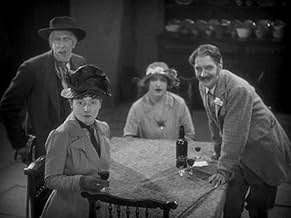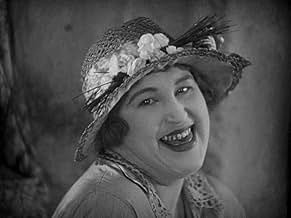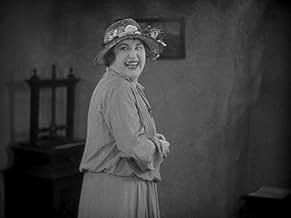ÉVALUATION IMDb
5,8/10
3,3 k
MA NOTE
Après le mariage de sa fille, un veuf d'âge mur avec une ferme rentable décide de se remarier, mais trouver une partenaire convenable s'avère un processus problématique.Après le mariage de sa fille, un veuf d'âge mur avec une ferme rentable décide de se remarier, mais trouver une partenaire convenable s'avère un processus problématique.Après le mariage de sa fille, un veuf d'âge mur avec une ferme rentable décide de se remarier, mais trouver une partenaire convenable s'avère un processus problématique.
Lillian Hall-Davis
- Araminta Dench - Sweetland's Housekeeper
- (as Lilian Hall-Davis)
Diana Napier
- Sibley Sweetland
- (as Mollie Ellis)
Harry Terry
- Guest at Wedding Breakfast
- (uncredited)
- …
Avis en vedette
Alfred Hitchcock- my personal favourite director- has done better with the likes of Psycho, Vertigo, Rear Window, Rebecca, The Lady Vanishes, Strangers on a Train and North By Northwest but he has also done worse with Juno and the Paycock, Champagne, Number Seventeen, Jamaica Inn, Topaz and Under Capricorn(though all have their redeeming merits). The Farmer's Wife is neither among the best or worst of Hitchcock, but it is still well worth watching and among the better of his silent films. It is too long, can get pedestrian and somewhat too slight in places(with a beginning that takes a little too long to set up) and the music score can feel repetitive. However, it is well shot and has lovely scenery, one of the better looking films of Hitchcock's silent era. Prepare yourself for a lot of point-of-view camera shots but they are not distracting at all(some may think differently though). Hitchcock directs with assurance and technical skill though he has done better in films more in his comfort zone. With the house party there are many subtle touches where you are thinking "yeah, this is unmistakably Hitchcock". The comedy is funny and charming if occasionally falling on the broad side, thankfully it is not overplayed and played with a degree of subtlety while making clear that the actors are enjoying themselves. The story is not always involving but does have its charms and you will be drawn in by the comedy and the likable if stock characters, it may have its slow spots but stick with it. The ending is very touching. The acting is good, again at times broad but not too much or that continuous. Gordon Harker is the standout and is immensely fun to watch, though Lillian Hall-Davies is suitably sympathetic and Jameson Thomas carries the film competently(his character is not easy to warm to straight away this said). Overall, interesting and providing that you don't expect masterpiece status- this is early Hitchcock where he was still finding his feet/style in a way- is also a good film. 7/10 Bethany Cox
After his wife dies, and their daughter marries, lonely widowed farmer Jameson Thomas (as Samuel Sweetland) decides to look for holy matrimony with another woman. With the help of devoted housekeeper Lillian Hall-Davis (as Minta Dench) and handyman Gordon Harker (as Churdles Ash), Mr. Thomas proposes to three matronly prospects: independent widow Louie Pounds (as Louisa Windeatt), frigid spinster Maud Gill (as Thirza Tapper), and pillowy postmistress Olga Slade (as Mary Hearn). None of the women prove to be satisfactory, but Thomas' ideal mate is closer than he thinks
If "The Farmer's Wife" were filmed a few years earlier, in Hollywood, with Wallace Reid and Norma Shearer, we might have had four decades of romantic Alfred Hitchcock comedies well, maybe not. Anyway, it's a good silent moving picture. The opening sequence, which shows the sad passing of the farmer's wife, is very effective; it's a good change from the original play, considering the silent film medium. But, this film is too long, with the daughter's marriage immediately and unnecessarily dragging the story down; moreover, the ending is drawn out. Mr. Hitchcock's food filming fetish is evident throughout - nobody touches Ms. Gill's gelatin!
****** The Farmer's Wife (3/2/28) Alfred Hitchcock ~ Jameson Thomas, Lillian Hall-Davis, Gordon Harker, Maud Gill
If "The Farmer's Wife" were filmed a few years earlier, in Hollywood, with Wallace Reid and Norma Shearer, we might have had four decades of romantic Alfred Hitchcock comedies well, maybe not. Anyway, it's a good silent moving picture. The opening sequence, which shows the sad passing of the farmer's wife, is very effective; it's a good change from the original play, considering the silent film medium. But, this film is too long, with the daughter's marriage immediately and unnecessarily dragging the story down; moreover, the ending is drawn out. Mr. Hitchcock's food filming fetish is evident throughout - nobody touches Ms. Gill's gelatin!
****** The Farmer's Wife (3/2/28) Alfred Hitchcock ~ Jameson Thomas, Lillian Hall-Davis, Gordon Harker, Maud Gill
This early Hitchcock silent, his first for British International Pictures, is a simple romantic comedy adapted from a stage play. A far cry from crime and suspense, but at this point Hitchcock had neither the influence nor the realisation of his true forte to select his projects.
As with all but one of the Hitchcock silents, the screenplay was by Eliot Stannard. Stannard, with his typical understanding of the visual medium, dispenses with the wordiness of a direct stage-to-screen adaptation. He allows time for the characters to reveal their feelings in reaction shots and point-of-view shots, and replaces verbal gags with visual ones. The Farmer's Wife is thus as devoid of unnecessary intertitles as, say, The Manxman.
Given its rural setting, Hitchcock was more or less obliged to include some shots of rolling hillsides. Hitch doesn't seem to have liked the countryside much – in most of his later films if it appears at all it's as a functional back-projection – but he doesn't do too badly here as far as pure photographic beauty goes. Other than that the shooting style is typical of Hitchcock. There is a growing use of fluid camera movement, and we can see that Hitchcock technique, whereby the camera appears to be leading the audience, gradually revealing to us or drawing us in.
Whether it comes from Stannard's script or Hitchcock's head I don't know, but there is a massive tendency here towards point-of-view shots during dialogue scenes, in which the other speaker looks straight into camera. The majority of these are rather pointless, with the exception of several appropriately ghastly close-ups of the Farmer's bridal candidates.
To say the conclusion of The Farmer's Wife is predictable would be a grand understatement. A shortsighted person could see it coming through several miles of fog. Not a bad thing in itself, but rather than play upon its obviousness (which Stannard and Hitchcock must have been aware of), the picture simply becomes a tedious game of waiting for the inevitable. The Farmer's Wife is only quite funny, and is altogether too long.
As with all but one of the Hitchcock silents, the screenplay was by Eliot Stannard. Stannard, with his typical understanding of the visual medium, dispenses with the wordiness of a direct stage-to-screen adaptation. He allows time for the characters to reveal their feelings in reaction shots and point-of-view shots, and replaces verbal gags with visual ones. The Farmer's Wife is thus as devoid of unnecessary intertitles as, say, The Manxman.
Given its rural setting, Hitchcock was more or less obliged to include some shots of rolling hillsides. Hitch doesn't seem to have liked the countryside much – in most of his later films if it appears at all it's as a functional back-projection – but he doesn't do too badly here as far as pure photographic beauty goes. Other than that the shooting style is typical of Hitchcock. There is a growing use of fluid camera movement, and we can see that Hitchcock technique, whereby the camera appears to be leading the audience, gradually revealing to us or drawing us in.
Whether it comes from Stannard's script or Hitchcock's head I don't know, but there is a massive tendency here towards point-of-view shots during dialogue scenes, in which the other speaker looks straight into camera. The majority of these are rather pointless, with the exception of several appropriately ghastly close-ups of the Farmer's bridal candidates.
To say the conclusion of The Farmer's Wife is predictable would be a grand understatement. A shortsighted person could see it coming through several miles of fog. Not a bad thing in itself, but rather than play upon its obviousness (which Stannard and Hitchcock must have been aware of), the picture simply becomes a tedious game of waiting for the inevitable. The Farmer's Wife is only quite funny, and is altogether too long.
The first half is rather slow, but keep going - it's definitely worth it. The humour in Hitchcock's films is generally based around great character actors (e.g. Jessie Royce Landis in To Catch a Thief and North by NorthWest), and here not one of the actors disappoints. Lillian Hall Davis has a better part in the Ring (also 1928 - Gordon Harker is again very amusing in it too), but is lovely in this film. Sound would have added nothing. My 8-year old daughter was apprehensive about watching a silent film, but once things started to get going in the second half, was hooked.
Hitchcock referred to it in later years as one of his "photographed plays", but the action occurs in several locations, so is nowhere near as constrained as many of his films (plays or not). In fact, even though the location shots are few and far between, they really give this film a non-studio feel.
All of Hitchcock's films are notable for their visual storytelling (look at the initial scene-setting in Rear Window that speaks volumes without a single word being uttered), and it is interesting to see the origins of this, and the great influence of German Expressionism.
Hitchcock referred to it in later years as one of his "photographed plays", but the action occurs in several locations, so is nowhere near as constrained as many of his films (plays or not). In fact, even though the location shots are few and far between, they really give this film a non-studio feel.
All of Hitchcock's films are notable for their visual storytelling (look at the initial scene-setting in Rear Window that speaks volumes without a single word being uttered), and it is interesting to see the origins of this, and the great influence of German Expressionism.
If you loved Sir Alfred Hitchcock and his contributions and services to the film industry, you should see all of his films for study and preservation. This is one of his early silent films. If you have the patience to watch a two hour silent film, it's not that easy. We're so used to speeches and conversations that we forget to watch and see their facial reactions in the early age of cinema. This film is more comedic than dark and dramatic. While the story is more farcical, it is nice to see Hitchcock have a sense of humor since he became more known for the macabre in his films. It is not hard to believe that film audiences didn't laugh and enjoy this film in the cinema in 1928 long before the Great Depression. Still, I would watch it again if I had too. It's not a bad film. You wouldn't know Hitchcock directed it.
Le saviez-vous
- AnecdotesUnlike most of his later films, this film does not have a cameo by Sir Alfred Hitchcock.
- GaffesAfter Louisa rejects Farmer Sweetland, his horse changes position it between shots as he mounts it.
- Citations
Farmer Sweetland: ...I am a man that a little child can lead but a regiment of soldiers couldn't drive.
- ConnexionsFeatured in The Skin Game (1931)
Meilleurs choix
Connectez-vous pour évaluer et surveiller les recommandations personnalisées
Détails
Box-office
- Brut – à l'échelle mondiale
- 152 $ US
- Durée
- 1h 40m(100 min)
- Couleur
- Mixage
- Rapport de forme
- 1.33 : 1
Contribuer à cette page
Suggérer une modification ou ajouter du contenu manquant































